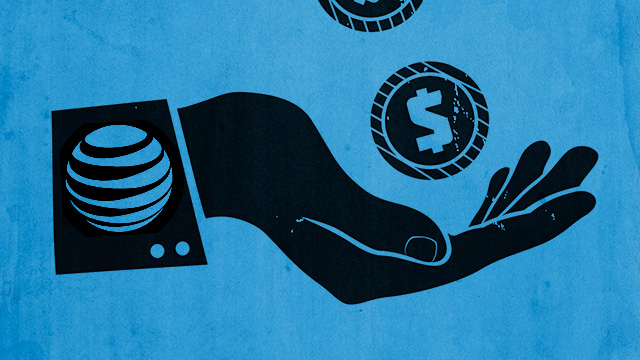
AT&T today confirmed a long-rumored plan to monetize wireless data caps by charging content providers for the right to serve up video and other media without chewing up consumers' monthly data limits.
Sometimes called 1-800-DATA, AT&T billed the plan as "a new way for eligible 4G customers to enjoy mobile content and apps over AT&T’s wireless network without impacting their monthly wireless data plan."
Basically, the price of data is being charged to content providers instead of consumers. The rates for consumers and business will be similar. "We will offer AT&T Sponsored Data providers a wide range of options," an AT&T spokesperson told Ars. "Customers will be billed according to usage, with costs varying by amounts of usage. Rates are comparable to consumer rates."
While it's likely that some services using sponsored data will be free to consumers, others will probably be fee-based ones, passing the data cost right back to cellular phone users. The platform is available to businesses today, with Sponsored Data services expected to be available to consumers this quarter.
Even before it was announced, rumors of AT&T's plan led consumer advocates to say that it violates the principles of network neutrality. However, AT&T believes the plan does not violate the Open Internet Order, the Federal Communication Commission's net neutrality regulation.
For one thing, the Open Internet Order's restrictions apply mainly to wired Internet service rather than cellular service. Additionally, AT&T said the Sponsored Data service should avoid net neutrality concerns because it doesn't give content providers a faster path to consumers.
"The delivery of content involved in this program would, of course, NOT be prioritized over any other data on our network," AT&T told Ars. "The only thing that changes under this model is that the sponsored content does not impact the user’s data plan. If a business doesn't see the value, there's no reason they'll ever need to use it."
Verizon Wireless has spoken favorably of the idea as well.
Consumer advocacy group Public Knowledge criticized the plan last May when it was rumored that ESPN was negotiating with at least one major wireless carrier to exempt ESPN content from data caps. The group pointed to a portion of the Open Internet Order that says, "If broadband providers can profitably charge edge providers for prioritized access to end users, they will have an incentive to degrade or decline to increase the quality of the service they provide to non-prioritized traffic."
As noted earlier, AT&T says it won't prioritize or degrade traffic in exchange for payment. Still, Public Knowledge Acting Co-President Michael Weinberg today wrote that the plan is "the latest example of how data caps are increasingly becoming used to threaten the open Internet."
The charge may be harmful to startups because it adds to the cost of becoming "the next big thing online," Weinberg said. "As AT&T CEO Randall Stephenson announced in May, data caps are all about forcing content creators to pay and are no longer about any sort of network congestion," Weinberg wrote, pointing to a public statement by Stephenson.
AT&T disputed the notion that Sponsored Data is bad for startups, saying that "small providers could see great benefit from this model as they seek to gain the attention of new customers and increase exposure to their offerings."
An API will be available for businesses to enable Sponsored Data. AT&T announced the names of three companies that have already signed up for Sponsored Data: UnitedHealth Group, mobile app development platform Kony, and mobile ad company Aquto.
AT&T said it expects interest from the health care, retail, media and entertainment, and financial services industries. Potential applications include:
- Encouraging customers to try a new smartphone or tablet app
- Promoting movie trailers or games
- Providing patient healthcare support via wellness videos
- Encouraging customers to browse mobile shopping sites
- Allowing businesses with ‘Bring Your Own Device’ policies to pay for the data employees use for specific business-related apps and services
- Enhancing customer loyalty programs by providing sponsored data access to products and services
The service will work on both websites and apps.
Consumer advocacy group Free Press joined Public Knowledge in condemning the new AT&T service.
“Caps are supposed to help wireless carriers manage congestion. But if getting a big check from another company suddenly makes AT&T’s congestion concerns go away, that shows data caps aren't necessary in the first place. Caps are merely another way to pad AT&T’s profits," Free Press Policy Director Matt Wood said.
Extra costs could indirectly hit consumers, he said. Additionally, “Content and app providers that can't pay this new toll to reach customers will be at a huge disadvantage and may never get off the ground in the first place if they can't afford AT&T's sponsor fees. Letting the carriers charge more or less money to reach certain sites is discriminatory, and it's not how the Internet is supposed to work."
reader comments
136